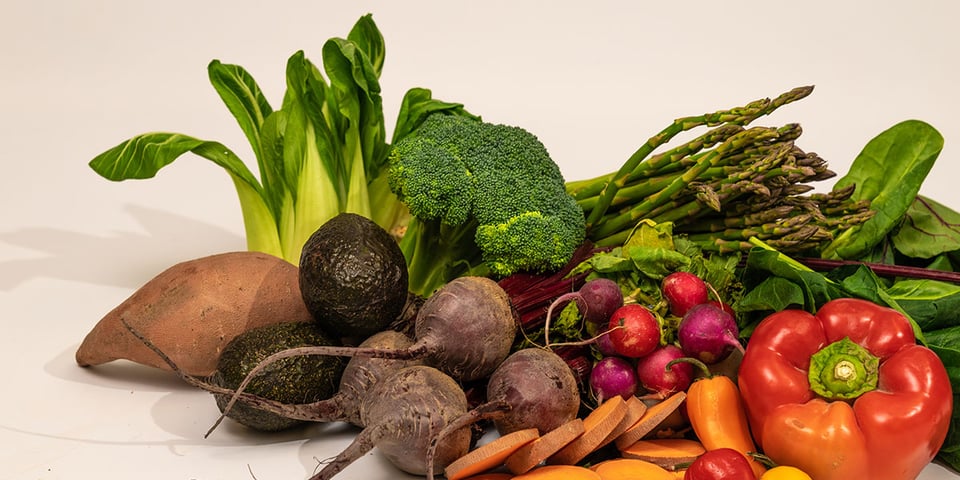The truth is, there is no single food that will make or break your weight loss goals, your health is a reflection of all of your food choices and habits throughout your lifetime, not a single moment in time.
However, we do know that the quality and quantity of foods we eat play a big role in shaping our overall health, and making or breaking any specific goals we have such as weight loss. Here is your breakdown of high-quality foods to add to your diet for sustainable weight loss without starving yourself!
What are the best foods for weight loss?
The best foods for weight loss include options that are high in nutrition and low in calories - supporting good health and helping you stick to your calorie limit.
Other great options are foods that help reduce hunger or cravings, helping to keep you on track, which is typically includes options that are rich in heart-healthy fats, protein, and fiber, along with options that are basically calorie-free!
Here’s your go-to guide for finding the best weight loss foods to stack your plate with.
- 20 Nutrient-Dense Foods
- 5 Healthy Fats
- 10 Lean Proteins
- 10 High Fiber Foods
- 10 High Volume Low-Calorie Foods
What is the Best Diet to Lose Weight Safely and Quickly?
When it comes to eating for weight loss, it doesn't matter what you call your diet, at the end of the day labels don't mean much and you should focus first understanding how much you need to be eating per day and what that looks like in food.
In other words, eating fewer calories than you burn every day is the most effective weight-loss method, not the style of diet you choose.
Contrary to what you’ve read on the internet, a single food cannot increase your metabolism, help you burn more fat, or prevent weight gain outside of calorie control.
Nobody has ever gotten fat from eating one donut and nobody has ever gotten a six pack from eating one salad.
However, while you could theoretically lose weight by eating dessert for every meal, too much added sugar can negatively impact your blood sugar levels - leading to poor health, increased cravings, and lack of energy.
Plus, cutting back on heavily processed foods and having a little more balance and good nutrition in your diet might do a little more than just help you shed pounds. Nutritious, healthy foods support better moods, energy levels, and appetite control, and, when coupled with the right fitness routine, can support a better overall body composition - more lean mass and less body fat (1,2).
20 Nutrient-Dense Foods

The easiest way to decrease your calories and increase your nutrition intake is by choosing more nutrient-dense foods. These are the foods that have the most nutrition per calorie, compared to other options that may be higher in empty calories, added fat, and sugar.
Many of the most nutritious low-calorie foods you can find tend to be non-starchy vegetables - this includes nearly all veggies, except peas, corn, potatoes, and winter squash. Other great sources of nutrient-dense foods include whole grains, fruits, and lean proteins.
The best nutrient-dense foods to stack your plate with include:
1. Arugula
Arugula has only 20 calories for every 2 cups (85g).
And it’s a good source of calcium and an excellent source of vitamin C, folate, and vitamin A.
2. Asparagus
Four spears of asparagus contain only 17 calories.
Plus it's a source of iron and folate and is high in vitamin K.
3. Bell Peppers
One-half cup of bell pepper is 26 calories and provides vitamin A, along with twice the daily value of vitamin C.
4. Bok Choy
Each cup of bok choy is only 10 calories, and contains folate, vitamin A, and high amounts of vitamin K.
5. Broccoli
With only 30 calories per cup, broccoli provides a good source of folate, 100% of the daily value for vitamin C, and 75% of your vitamin K needs.
6. Brussels Sprouts
One cup of Brussels sprouts has 40 calories and is a great source of fiber, folate, vitamin C, and vitamin K.
7. Carrots
A cup of carrots is 45 calories, and packed with vitamin A, along with fiber and vitamin C.
8. Collard Greens
For only 25 calories, 2 cups of collards provide fiber, vitamin C, vitamin E, vitamin A, and folate.
9. Greek Yogurt
A 5oz standard serving of Greek yogurt is about 110 calories and packs high amounts of protein, riboflavin, and phosphorus, calcium, and vitamin B12.
10. Edamame
A cup of edamame provides 110 calories, of fiber, iron, magnesium, potassium, and zinc! Plus it's an excellent source of plant-based protein and copper.
11. Eggs
At only 70 calories each, eggs will get you protein, iodine, riboflavin, vitamin D, and high amounts of selenium, choline, vitamin B12, and vitamin A.
12. Kale
A known “superfood,” two cups of kale has fiber, potassium, vitamin C, vitamin K, and vitamin A for only 50 calories.
13. Oats
Start your day with fiber, iron, protein, vitamin B6, folate, and thiamine for only 150 calories (in a ½ standard cup serving).
14. Oysters
A lesser-known nutrition powerhouse, for only 40 calories, a mere two oysters provide protein, choline, iron, and selenium, plus 270% of your daily copper, 300% of vitamin B12 needs, and 300% of the daily value for zinc.
15. Pumpkin
A small ½ cup serving of pumpkin has 50 calories, fiber, iron, vitamin E, and 100% of your vitamin A needs.
16. Salmon
Salmon has much more than omega-3 fatty acids.
A three-ounce serving provides 150 calories, a good source of potassium, high amounts of protein, vitamin D, selenium, vitamin B12, and small amounts of vitamin A,
17. Seaweed
A cup of raw seaweed is only 30 calories and packs a good amount of iron, magnesium, vitamin C, riboflavin, vitamin K, and high amounts of folate and iodine.
18. Spinach
A whopping two cups of spinach is only 10 calories and provides a ton of nutrients including iron, magnesium, folate, vitamin A, and vitamin K.
19. Swiss Chard
Like other leafy greens, 2 cups of Swiss chard is low calorie (15 calories) and provides a good source of key nutrients like magnesium, vitamin E, and high amounts of vitamin C and vitamin A.
20. Sweet Potatoes
A medium-sized orange sweet potato will get you fiber, potassium, and a ton of vitamin A for only 100 calories.
5 Healthy Fats
Fat is both flavorful and satiating, helping you feel more satisfied with your meals. In fact, some research suggests that cutting your fat intake too low can cause you to have a harder time sticking to your diet (3,4).
Of course, fat is also the most calorie-dense macro—packing more calories in a smaller portion, so portion control is key.
The top sources of healthy fats for weight loss are:
1. Peanut Butter
Peanut butter or any nutter butter is a favorite high-fat food for many. It also packs a decent amount of protein and nutrients like vitamin E and magnesium, and pairs well with just about any fruit or veggie.
2. Almonds
Similar to nut butter, nuts like almonds are a great high-fat snack or topping to add a small boost of nutrition while keeping you satisfied.
Plus, almonds are the highest-fiber nut, giving them even more staying power.
3. Avocado
Avocados are a high-fat fruit that packs a good amount of heart-healthy fats, fiber, and nutrition, like vitamin C and potassium. And it pairs well with just about any dish you can think of, including salads, sandwiches, soups, eggs, and more!
4. Fatty Fish
Salmon isn’t the only fish that provides high amounts of omega-3s. Other types of fatty fish and seafood like herring, mackerel, and sardines are also worth including.
5. Chia Seeds
Chia seeds, like most seeds, are a source of healthy plant-based fat and nutrition, but they also have a unique property that gives them an edge in controlling hunger. When mixed with water, chia seeds expand to up to 10 times their sizes, forming a gel that fills your stomach and keeps you super satisfied for hours.
5 Lean Proteins for Anyone Trying to Lose Weight

Protein is the most notable hunger-busting nutrient. High protein diets have long been associated with improved satiety and appetite control (5,6,7). Protein is also thought to help reduce cravings and support improved body composition by supporting your lean muscle mass while dieting.
Additionally, protein is the least likely of all the macros to be stored as body fat when you overdo it.
But not all proteins are created equal. When looking at animal sources like meat, dairy, and fish, leaner options tend to provide excellent nutrition for less saturated fat and calories, making them a great choice for an energy-controlled diet.
For the most protein-dense foods, look for options with at least 10 grams of protein for every 100 calories.
Some of the most popular lean proteins are:
1. White Fish
Whitefish is basically pure protein because it is so low in fat and contains no carbs. Thus, adding some tilapia, basa, or cod to your plate is an excellent way to hit your protein macros with ease!
2. Chicken
Arguably the most popular lean protein, skinless chicken breast is incredibly low in fat and high in nutrition. However, skinless chicken thighs are also a great flavorful addition for only a few extra calories.
3. Turkey
Turkey, the other white meat, is also a fairly lean option that can be used in just about any dish and provides high amounts of quality protein.
4. Cottage Cheese
Like other low-fat and nonfat dairy options, cottage cheese contains a ton of protein and essential nutrients to support your goals.
5. Lean Beef
Lean grass-fed beef provides all the nutritional benefits of red meat, like iron, B vitamins, protein, and zinc, with less fat and calories.
10 High Fiber Foods to Keep You Fuller for Longer
Eating more fiber is a great way to control appetite and promote health (8). There are two types of fiber found in plant foods - soluble and insoluble, and both hold unique benefits.
Insoluble fiber is a type of carb that is not easily absorbed by the body, and because what goes in must come out, it still needs to be pushed through your system - which is exactly how this type of fiber helps keep things moving along.
Soluble fiber dissolves in water to form a gel-like substance. When you eat it, water gets drawn into your gut and allows the fiber to expand, helping you feel more full. This process is also thought to help draw out cholesterol from the body providing heart health benefits to you (9)!
Some of the best high fiber foods include:
1. Beans
A popular plant-based protein, beans are high in nutrition and provide 7 grams of fiber per ½ cup.
2. Artichokes
Artichokes are one of the highest-fiber veggies you can find, providing 6.5 grams of fiber for one medium-sized artichoke.
3. Lentils
Lentils are also a source of plant-based protein and pack around 6.5 grams of fiber for each serving.
4. Apples
One medium apple contains vitamin C and up to 6 grams of fiber for less than 100 calories.
5. Whole Wheat Pasta
Pasta may seem like an anti-diet food, but it's naturally rich in protein and fiber, along with many key nutrients - a single serving has about 6 grams of fiber.
6. Dried Figs
Often used as a natural sweetener, dried figs can help curb sugar cravings and provide about 5 grams of fiber per serving.
7. Green Peas
Peas contain some protein and essential nutrients along with 4.5 grams of fiber for every ½ cup serving.
8. Berries
Most berries, including blueberries, strawberries, blackberries, and cherries, are high in nutrition and provide a decent amount of fiber - roughly 4 grams per serving.
9. Quinoa
A complete plant-based protein and popular diet food, quinoa has four grams of fiber for every ½ cup serving.
10. Pears
One medium pear has four to six grams of fiber and is an excellent source of vitamin C.
10 High Volume, Low-Calorie Foods to Help Cut Calories
Because calories are king when it comes to losing weight, any food that packs a large serving for a few calories can be a beneficial choice - especially when these options help curb cravings and calm mindless munching.
The top “high volume” foods for munching include the following low-calorie foods.
1. Celery
Essentially calorie-free, celery makes for an excellent chip substitute and pairs well with most dips, dressings, and nut butters.
2. Cucumbers
Similar to celery, cucumbers are high in water content and make for a refreshing snack or cracker substitute.
3. Lettuce
Lettuce is great filler food, adding a lot of volume to your meal for little to no calories.
4. Summer Squash
Summer squash is also high in water and pairs well with just about any dish you can think of.
5. Radishes
Radishes are one of the lowest-calorie veggies out there and add a nice crunch and spice kick to your salads and wraps.
6. Melon
As the lowest carb fruit you can find, melon is mostly water and makes for a great sweet snack.
7. Pickles
Pickled non-starchy veggies - especially cucumbers, make for a wonderfully crunchy and flavor-packed snack option or side to any meal.
8. Salsa
The lowest calorie dip you can think of, fresh salsa packs a decent amount of nutrition for a few calories - try this as a dressing substitute for your taco salad or add to shredded chicken while cooking for a lean and flavorful sauce.
9. Air Popped Popcorn
When made without any added oil or butter, an entire cup of popcorn has only 30 calories and makes the perfect base for any healthy seasoning blends you can think of.
10. Sugar-Free Jello & Popsicles
Dessert with zero guilt, sugar-free jello and popsicles can satisfy your sweet tooth for little to no calories.
Choosing Foods for Weight Loss
There's not one single food you have to have in your diet to lose weight or any food that you shouldn't have either.
With that, the best foods for weight loss also tend to be the most nutritious, allowing you to cut calories and shed pounds without sacrificing your health. But no matter what, you always want to choose foods you enjoy eating, otherwise, it's going to make sticking to your eating plan pretty difficult.
Set yourself up for success with science-based weight-loss advice, tips for conquering cravings, the best fat-burning workouts, and more!
Download your FREE Ultimate Weight Loss and Transformation Guidehere!




